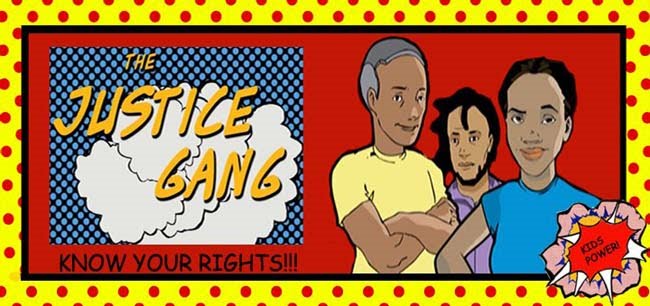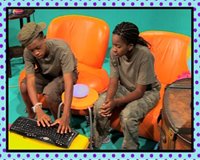Today we're looking at your Right to Get an Education. The children’s charter says very clearly that all children have the right to free and equal, non-racial, and non-sexist education. A non-sexist education means that girls and boys should be treated the same in schools.
 According to the UN Declaration on the Rights of the Child:
According to the UN Declaration on the Rights of the Child: Children have:
* The right not to suffer discrimination (article 2)
* The right to have your best interests at the top of the agenda (article 3)
* The right to develop as fully as you can (article 6)
* The right to an education (article 29)
Here's an email we received from one of the kids who saw our TV show on the SABC:
My name is Mandisa. I live with my father and my four brothers. I am in high school and I really enjoy it. I think that it is very important to finish high school because I want to do something important with my life. I’m not exactly sure what yet, but I know that if I am not properly educated I won’t be able to get a good job. The problem is that my mother died and my father wants me to quit school so I can stay at home and look after my brothers. He says there is no one to do the washing and ironing and the cooking anymore and now it is up to me. He also says he thinks it will be safer for me at home. I know that it is important to look after your family but what about what I want? Don’t I have the right to finish my education? How can I convince my father that I should stay in school?
The Justice Gang did some research to see of we could help Mandisa, and this is what we found out:
 In 2000, leaders from around the world signed the Millennium Declaration, which outlined eight important goals that they want to achieve by 2015. Goal number three is to Promote Gender Equality and Empower Women. This means making sure that women have the same chances as men to improve their lives and the lives of their families.
In 2000, leaders from around the world signed the Millennium Declaration, which outlined eight important goals that they want to achieve by 2015. Goal number three is to Promote Gender Equality and Empower Women. This means making sure that women have the same chances as men to improve their lives and the lives of their families.Equal access to education is an important part of promoting gender equality. Education for all is important if we are to solve the world’s biggest problems. Reducing poverty, improving general health, halting the spread of HIV and AIDS, and enabling people to play a full part in their communities and nations, are all made more possible by access to education.
 Unfortunately, in many countries in the world, women are often not given the same opportunities as men. For example, many poor households in developing countries will only send their boys to school, forcing girls to help care for the home and other family members. Around the world, more than 115 million children of primary-school age are not in school. Nearly 53 per cent of these children are girls. Two-thirds of the world’s illiterate people are female.
Unfortunately, in many countries in the world, women are often not given the same opportunities as men. For example, many poor households in developing countries will only send their boys to school, forcing girls to help care for the home and other family members. Around the world, more than 115 million children of primary-school age are not in school. Nearly 53 per cent of these children are girls. Two-thirds of the world’s illiterate people are female.Sadly, uneducated girls grow up to be disadvantaged women. Without an education, it is not easy to get a good paying job and on average, women earn only three-quarters of what men earn. By the age of 13 or 14, a girl with little education or knowledge of her own rights may find she has few choices. She may marry early or, if she works outside the home, she may be at greater risk of being overworked, underpaid, and even physically abused.
An educated woman has more options, including a career, marrying later, not marrying at all, and having fewer children. She knows that she has rights and is likely to have more control over her life. But educating girls isn't just good for girls and women. It's good for everyone. For example, if a girl learns about human rights, health and safety issues, she can pass this knowledge on to her family and to friends.
 Educated women are in a better position to know how best to protect and nurture their children. They are likely to make sure their own children – boys and girls – are educated. With the knowledge and skills they develop, they can become productive workers and earn higher salaries, bringing in income for their families and contributing to local and national economies. They can also help improve their communities and environments.
Educated women are in a better position to know how best to protect and nurture their children. They are likely to make sure their own children – boys and girls – are educated. With the knowledge and skills they develop, they can become productive workers and earn higher salaries, bringing in income for their families and contributing to local and national economies. They can also help improve their communities and environments.In other words, educating girls as well as boys is good for boys as well as girls.
It's also important to know that you have the right to schools that are safe from violence and abuse, and corporal punishment is not allowed. That means teachers are not allowed to cane or hit you or hurt you in any way. If your school is not safe, or if teachers are using corporal puishment you have the right to report this to the proper authorities like the Department of Education.
 To sum up, you have the following rights concerning education:
To sum up, you have the following rights concerning education: 1. Protect your rights – schools should make sure your rights are protected, especially your right to good quality education that helps you develop to your fullest potential.
2. Put your interests first - above the interests of teachers, or local authorities, or even your parents or guardians.
3. Consider the whole you – schools should provide you with a wide range of activities and experiences that build up your self-esteem and self-confidence and help you to be healthy and happy. Schools should also support you if you have worries or problems either at school or elsewhere.:
4. Not discriminate against you in any way.
Here is some more information from UNESCO on your right to get an education. Just click here.
Well, that's it for now, don't forget to email us or leave us a blog comment, we'd love to hear your thoughts and opinions.

Cheers for now
Gugu













No comments:
Post a Comment